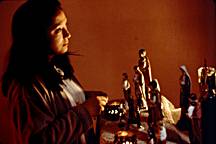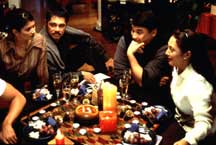

There is some unwritten movie law that when portraying different cultures on film, the film must include into its subplot some aspect of the foreign cuisine. It worked well in Eat Drink Man Woman, and to varying other degrees in movies like Woman on Top, What's Cooking, and Tortilla Soup. This time, the Filipino culture gets a shot with American Adobo. Aside from some mentions of adobo and frequent shots at meal times, food has very little to do with this movie, which is essentially a movie about people going through a mid-life crisis. Nothing new here. Even worse, the quality is that of a bad sitcom with stereotypical sitcom characters, so there are failed attempts at both humor and moments of poignancy.
American Adobo plays like a woman's film with some men in the cast. There are five central characters, most of them friends from college. They all live in New York, and are undergoing some changes that force them to reevaluate their lives. Mike (Christopher De Leon, The 13th Chapter, Embrace the Dawn) is overworked an in an unhappy marriage. He is not sure he loves his wife, who ignores the children and plays mah-jongg all night. Marissa (Dina Bonnevie, Tanging Yaman, Elena's Redemption) is stuck in a relationship with Sam (Randy Becker, Love! Valour! Compassion!, Sabrina), who continually cheats on her. She kicks him out constantly, but always lets him back into her life. Gerry (Ricky Davao, Dog Food, The Kite) is gay but still in the closet, even to his friends and especially to his mother. He ducks questions about why his 'girlfriend' Chris (Wayne Maugans, Cross-Eyed, Johnny Suede) never shows up to gatherings. Raul (Paolo Montalban, Cinderella) is Marissa's cousin, and the youngest of the group. He is a handsome young man whose only goal seems to be going through as many women as possible. He has his way with them then literally throws them out. The last person is Tere (Cherry Pie Picache, Anak, Burlesk King). Tere is nice, a little round, and a great cook. She is also lonely, and cannot seem to ever find a date.
These are all real problems, but director Laurice Guillen (Tanging Yaman, Salome) goes the route that millions of movies and television shows previously traveled. There is nothing new in any of these characters or their travails, and Guillen and writer Vincent R. Nebrida choose to show the humorous side of their problems more than anything else. Some of the stereotypes presented (not Filipino stereotypes, but character stereotypes) are so one-dimensional that they are almost offensive. The first half of American Adobo is a comedy, almost along the lines of 'wacky.' Guillen takes very little seriously, playing everything for laughs. This becomes a problem in the second half, when the tone of the movie takes a tone for the serious. The two halves do not mesh. The sometimes somber tone of the latter half of the movie feels as contrived as the humorous situations in the first.
The one thing this movie gets right is the language duality. These people are Filipino Americans, just as comfortable in their native Tagalog as they are in English. Their speech mixes both languages together, forcing non-native speakers to read the subtitles. Although this is an American production, there is not that much English. The acting is typical of that of most Asian cinema where overacting is the rule. There is no subtlety in the way these actors deliver their lines. Guillen and Nebrida do not help matters by injecting so much false drama into the lives of the characters. Everything these people go through is some life-defining situation that resolves itself neatly in the end. They overreached in their ambitions by trying to show the diversity of their culture. To them, it meant taking wildly different characters and throwing them together instead of focusing on and developing one or two people. This is the second film in recent memory to center on the lives of Filipino Americans. The Debut was the other one, and while that was also formulaic, it was much more enjoyable because it was earnest. American Adobo tries to be earnest near the end, but by then the story is ruined with all sorts of random shenanigans.